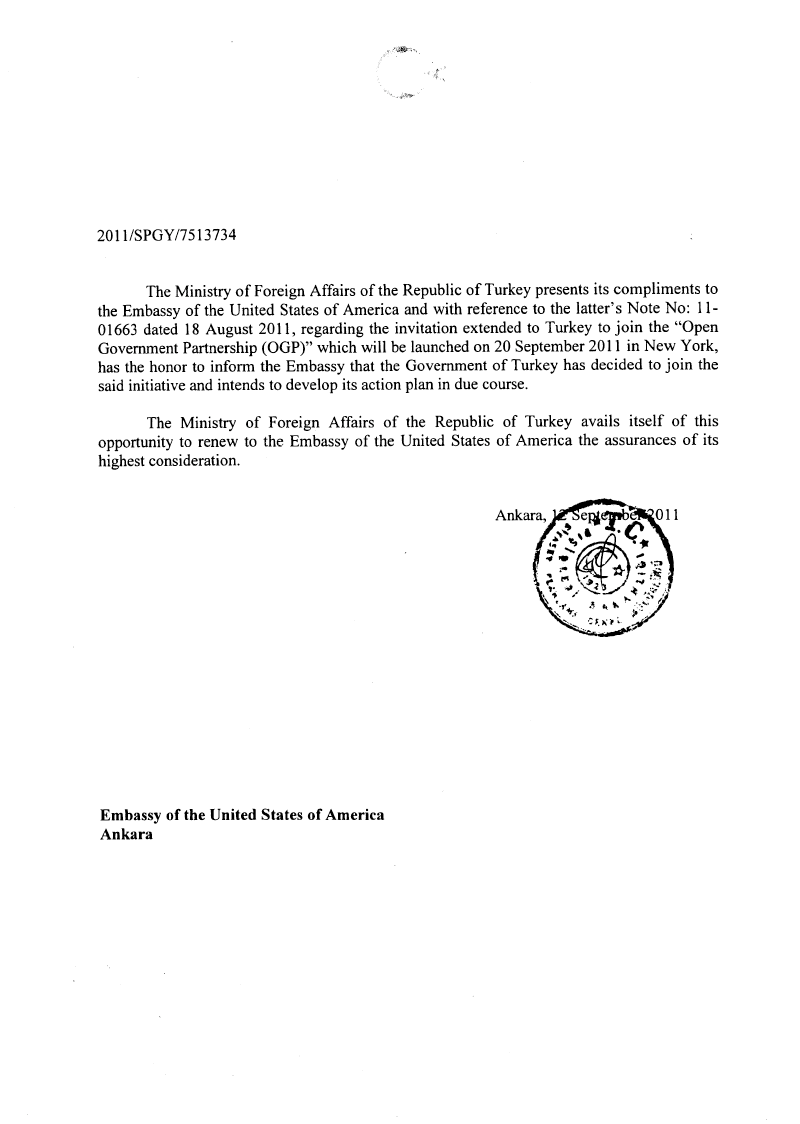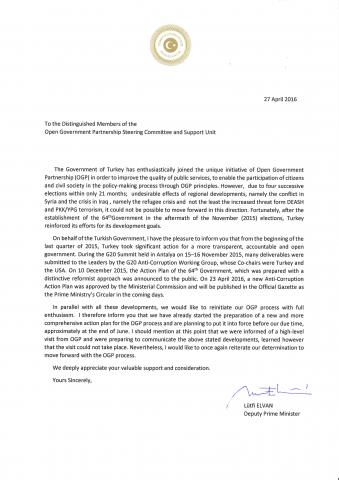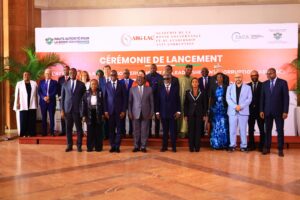In the last twelve months, the Government of Turkey did not engage with the OGP Steering Committee, and did not publish a new National Action Plan. Therefore, the OGP Steering Committee instructed the Support Unit to end Turkey’s inactive status and its participation in OGP. A letter indicating this decision has been sent to the Government of Turkey.
Please note that during its September 21, 2016 meeting, the Open Government Partnership Steering Committee upheld the resolution they unanimously approved during their Cape Town May 4th, 2016 meeting regarding Turkey’s participation in the Open Government Partnership. For more information on the steps leading up to this decision and what it means for the country’s participation in OGP, please see the media briefing.
The following text was contributed by the Government of Turkey.

UPDATE: On 27 April 2016, Deputy Prime Minister Lütfi Elvan submitted this letter to the OGP Steering Committee. Please see the Steering Committee page for information on any resolution or response.
27 April 2016
To the Distinguished Members of the Open Government Partnership Steering Committee and Support Unit
The Government of Turkey has enthusiastically joined the unique initiative of Open Government Partnership (OGP) in order to improve the quality of public services, to enable the participation of citizens and civil society in the policy-making process through OGP principles. However, due to four successive elections within only 21 months; undesirable effects of regional developments, namely the conflict in Syria and the crisis in Iraq, namely the refugee crisis and not the least the increased threat form DEASH and PKK/YPG terrorism, it could not be possible to move forward in this direction. Fortunately, after the establishment of the 64*Government in the aftermath of the November (2015) elections, Turkey reinforced its efforts for its development goals.
On behalf of the Turkish Government, I have the pleasure to inform you that from the beginning of the last quarter of 2015, Turkey took significant action for a more transparent, accountable and open government. During the G20 Summit held in Antalya on 15–16 November 2015, many deliverables were submitted to the Leaders by the G20 Anti-Corruption Working Group, whose Co-chairs were Turkey and the USA. On 10 December 2015, the Action Plan of the 64* Government, which was prepared with a distinctive reformist approach was announced to the public. On 23 April 2016, a new Anti-Corruption Action Plan was approved by the Ministerial Commission and will be published in the Official Gazette as the Prime Ministry’s Circular in the coming days.
In parallel with all these developments, we would like to reinitiate our OGP process with full enthusiasm. I therefore inform you that we have already started the preparation of a new and more comprehensive action plan for the OGP process and are planning to put it into force before our due time, approximately at the end of June. I should mention at this point that we were informed of a high-level visit from OGP and were preparing to communicate the above stated developments, learned however that the visit could not take place. Nevertheless, I would like to once again reiterate our determination to move forward with the OGP process.
We deeply appreciate your valuable support and consideration.
Yours Sincerely,
Lütfi ELVAN
Deputy Prime Minister

Commitments
- Setting up a Web Portal Named http://www.Transparency.Gov.Tr (2012)
A web portal will be set up, which will provide all the current information about the projects and strategies implemented by the Government regarding integrity, transparency, accountability and combating against red tape and corruption; all legal and other arrangements in these fields; all international conventions that we are party to and the activities carried out at international organizations of which we are a member.
Our aim through this web site will be, to set up an infrastructure whereby it will be possible to receive feedback from citizens regarding draft laws and bills, as well as all issues related to the implementation of these regulations. Thus the public will continuously be fully informed and active participation in these matters will be encouraged. - Holding an Advisory Platform for Transparency in Public and Openness, at Least Once a Year, with the Broad Participation of Representatives of Public Sector, Non-Governmental Organizations and Private Sector; Holding Seminars, Workshops and Conferences with a View to Increasing Public Awareness in the Areas of Integrity, Transparency, Accountability and Combating Against Corruption, (2012)
This platform will enable different segments of our society to thoroughly discuss the social and economic effects of steps taken in the fields of integrity, transparency, accountability and combating against corruption; trigger debates on which measures should be taken on these issues. Various reports will be prepared and evaluation of the results of the previous year will be conducted.
Both by means of http://www.transparency.gov.tr and via seminars, conferences and workshops to be held under the leadership of Non-Governmental Organizations, our target is to keep the public’s interest continuous on matters related to integrity, transparency, accountability and combating against corruption. - Plotting a Risk Map by Determining the Risk Areas Open to Corruption and Taking Preventive -Deterrent Measures Against Corruption (2012)
We plan to collect statistical data based on notifications forwarded to the units which accept complaints from citizens, such as the Prime Ministry Inspection Board, inspection units of Ministries, Public Prosecution Offices, the Prime Ministry Public Officers Ethics Board, the Prime Ministry Communication Center (BİMER) and Board for the Evaluation of Requests for Information. Besides the reports prepared by inspection and audit units, the Court of Accounts, international organizations, non-governmental organizations, think-thank institutions, as well as private sector and academic circles, studies such as surveys and rules of judicial authorities will be utilized. Scientific evaluation of these data will facilitate the determination of the root causes of corruption, hence enable us to take preventive and deterrent measures.
- Measuring the Suitability and Effectiveness of the Existing Measures and Policies in Matters of Reducing Bureaucratic Red-Tape, Increasing Integrity, Transparency and Accountability and Combating Corruption Through Efforts to Be Carried Out Regularly and Conducting Surveys in Order to Determine the Perception of Citizens and the Business World and Sharing Results with the Public. (2012)
Through such work, we will strive to measure the effectiveness and suitability of public policies carried out in the abovementioned fields and to assess how these policies resonate with our citizens and the business world. Our aim is to conduct these studies regularly and to utilize available data in comparative studies over the years.
- Transparency in Public Expenditures – http://Www.Spending.Gov.Tr (2012)
Although the current legislative framework and information systems pertinent to public expenditure mark a significant enhancement in terms of transparency, there remains much to be done in order to make public expenditure data more user-friendly for the public at large. To that end, multiple information systems related to public expenditures will be integrated and more user friendly public expenditure portals will be established.
- Engaging Citizens and Other Concerned Parties in Policy-Making Processes – http://Www.Regulation.Gov.Tr (2012)
Engaging citizens, the business world and other interested parties in the preparation phase of policy instruments such as laws, regulations, and notifications which are on the agenda of the government is important. Through the web portal http://www.regulation.gov.tr to be established under the Prime Ministry, the public will be informed expeditiously and in a user friendly, clear manner. Moreover, participation and contribution will be encouraged over the initiation of blogs.
- Electronic Public Procurement Platform (2012)
The electronic public procurement system will first be tested in the acquisition of medical devices and of general consumable goods which have been determined as the pilot areas of study. This system will make bidding and evaluation electronically possible, but will also necessitate changes in regulations and hard/soft ware procurement. In the future this system will be applied in other sectors. We will update and upgrade the system in compliance with the feedback from public institutions, active bidders and any legislative amendments that may take place.
Related

In Côte d’Ivoire A United Front Against Corruption
Côte d'Ivoire is opening up the fight against corruption through a new strategy built with civil society. From digital tools to whistleblower protection, a fragile but promising dialogue is underway.

